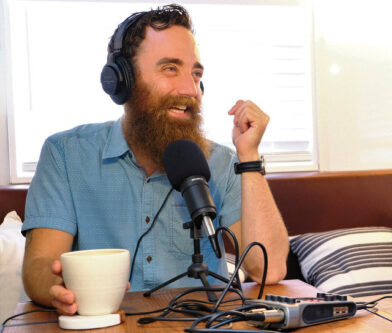Tiny home podcast ready to focus on environmental impact
By Al Beeber on October 27, 2021.
 photo by Emmy Schenk -
Michael Bartz's six-part podcast "Over my Head," will feature interviews with experts on reducing human impact on the environment.
photo by Emmy Schenk -
Michael Bartz's six-part podcast "Over my Head," will feature interviews with experts on reducing human impact on the environment.LETHBRIDGE HERALDabeeber@lethbridgeherald.com
Telus Storyhive grant winner Michael Bartz is ready to premiere his six-part podcast “Over my Head,” in which he talks to experts about reducing human impact on the environment.
The podcasts focus on Bartz’s own efforts as the builder and occupier of a “tiny home” that he constructed and his discussions with experts about whether he is actually making a difference and what can be done on a broader scale to reduce mankind’s environmental footprint.
Lethbridge area resident Bartz has a diploma in acting and produced six commercials for Environment Lethbridge’s WasteLess campaign.
In 2017, Bartz began building an 18.5 square metre – 200 square-foot – tiny home which he lives in with his partner and cats.
The mobile structure is now parked on a farm just east of the city and while Bartz did consider briefly travelling across Canada and doing a documentary, he has since decided he’d rather not move the structure more than he has to.
“I built it in Lethbridge and I moved it out to the farm here; even that was like, I was on pins and needles, making sure nothing happened. It’s probably fine but moving it across the country probably isn’t realistic. Now that it’s our home, I don’t want to have a window break or something happen and it tips over,” he said in an interview Tuesday.
But having a tiny home gives Bartz and his partner the freedom to hit the road and move elsewhere if they ever desire.
“We don’t know where we’ll be in 20 years,” said Bartz.
The podcast, which will debut first on Telus TV in early November, will also be available on platforms such as Spotify, Apple and Amazon, where he’ll hold an official launch on Nov. 8.
In the meantime, he’s already looking at creating more seasons of the podcast, which will focus on specific issues such as transportation to provide a deeper conversation about environmental issues.
He pitched the idea of a podcast to Telus in November 2020 and successful applicants for the $10,000 Storyhive grants were chosen in March.
“It’s been about a year in the making,” he said Tuesday of the podcast plan.
The tiny home itself took him four years, three part-time and one full-time.
“I wanted to downsize and I wanted to reduce my environmental footprint and so that seemed like a natural choice for me,” Bartz said of building the structure.
The small home “took a lot of designing and thinking through and planning and lots of storage space. We’ve got a loft up above the living room that’s the sleeping area. So the space works really well,” he said.
“I designed it to live full-time year round in Canada so it took a fair bit of planning” including insulation and heating system, Bartz said.
A key to the house was trying to fit both people and stuff inside for comfortable day-to-day living.
“We tried to find that balance.”
The podcast storyline centres around Bartz’ efforts to downsize and reduce his environmental footprint.
“I’m doing all these things and making these big changes, drastic changes in my life. But I’m really wondering is that making a difference and when it comes to saving the planet and that kind of goal, that’s how I feel in over my head.
“Are all these things making a difference and is all this worth it? So the podcast is actually me interviewing environmental experts, talking about ‘I’m living tiny, is this a good idea. Is this helping, what else can I be doing in order to get other people on board as well? Because it’s not realistic everyone is going to live in 200 square feet. There are other things that people can do so we’re getting that conversation started around reducing your environment footprint.
“Me living this way is a great way to get that started,” Bartz said.
“I want to interview experts, interview scientists and researchers and people who are knowledgeable because I think there are a lot of misconceptions around that topic (reducing footprint). And what is effective and what is not effective. And me personally I feel like I’m doing all these things but is it the big polluter – are they the big difference? Is me doing all this not really making any sort of change or is it? So I think it’s that bigger conversation, as well. And I feel that if people can make informed choices, then we can all hopefully have a shot at saving the planet,” Bartz added.
“Obviously one person can’t change the world,” said Bartz, but if more people took steps to reduce their footprint, then he believes changes will happen.
“A smaller environmental footprint does have a positive impact as long as more people do it,” he said.
“Me living this way is also a way of saying ‘hey I’m doing this, you can do it, too'” but that doesn’t mean living in such a small home, he said.
People can reduce their footprint by lowering overall energy consumption, using energy-efficient appliances, improving insulation, driving less and eating more locally produced food, he said. And perhaps moving into smaller homes.
“From my perspective, I enjoy living this way and downsizing. I enjoy the challenge and doing something that’s out of the ordinary. But it’s not realistic for everyone and not everyone is going to live with no electricity or never fly again. It’s not realistic. We can’t turn the clock back so what can we do to fix things now?”
Follow @albeebHerald on Twitter
4-3


